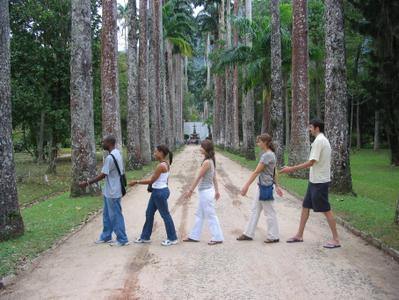I admit, sometimes it happens. Even to me.
Life in Brazil revolves around papers. Papers, more papers, and other more papers. Birth certificates [including those of your parents], personal identification documents [also including those of your parents], proofs of residency, salary stubs, bank statements, you name it, they want to see it.
 The two most important documents for any Brazilian are the CPF [physical personal registry] and the RG [general registry]. Without these two documents, nothing is possible, and in essence, a person who has neither a CPF nor an RG is not recognised as a person by the State. He or she cannot legally work, cannot go to school, cannot receive any health care, cannot vote, cannot open a bank account, cannot legally rent an apartment [although there are so many other documents needed in order to rent an apartment that having a CPF is not even a fraction of the way there], cannot own land, cannot buy household appliances, cannot get a phone line, cannot legally take an intercity bus, the list goes on. The crux of obtaining a CPF and RG rests on having been registered at birth and thus having a birth certificate. Although fewer and fewer Brazilian babies are not registered these days, for those who are not or weren't, it remains difficult to procure the rest of their documents. Life without personhood is not easy and it is almost impossible to aspire to better socio-economic conditions. Without a CPF one cannot even rent a video at the local video store. Enter Karen, stage left....
The two most important documents for any Brazilian are the CPF [physical personal registry] and the RG [general registry]. Without these two documents, nothing is possible, and in essence, a person who has neither a CPF nor an RG is not recognised as a person by the State. He or she cannot legally work, cannot go to school, cannot receive any health care, cannot vote, cannot open a bank account, cannot legally rent an apartment [although there are so many other documents needed in order to rent an apartment that having a CPF is not even a fraction of the way there], cannot own land, cannot buy household appliances, cannot get a phone line, cannot legally take an intercity bus, the list goes on. The crux of obtaining a CPF and RG rests on having been registered at birth and thus having a birth certificate. Although fewer and fewer Brazilian babies are not registered these days, for those who are not or weren't, it remains difficult to procure the rest of their documents. Life without personhood is not easy and it is almost impossible to aspire to better socio-economic conditions. Without a CPF one cannot even rent a video at the local video store. Enter Karen, stage left....
Two weeks ago, I decided to rent a Friday-night video and headed to the video store around the corner. I was armed with a multitude of documents including my CPF number [I have a number, but the actual card never arrived even after chasing it down for months and months], my RNE [a foreigner's equivalent of the RG] and my passport [nice red passport!]. As excepted, the salesgirl immediately asked for my CPF in order to register me. I handed over the slip of paper with my CPF number on it and indicated that it was the correct number. The girl immediately gave it back to me and asked for the original card. My response that I had never received the card, that this was my CPF and that she could easily hop on the Receital Federal website to verify its accurracy since all information about CPFs is open access through the website [type in the number and out pop the details -- maybe this is why the Receita Federal is the most searched website through Google Brasil] did not get me much further. I pulled out the rest of my documents, but to no avail. There would be no video that night.
The next day, after recovering from the episode, I gathered up even more documents, including a recent telephone bill which has my CPF and address written on it and a bank statement which also has both my CPF and address, and headed to yet another local video store. The girl at store #2 was also reluctant to trust my CPF number scribbled on a post-it note. Getting bolder, I asked for the manager, spread my twelve different documents across the counter, and offered to help them check the Receita Federal website to legitimise my CPF number. Finally, they acquiesed and gave me a membership. And now, for the brilliance of the whole thing. At the end of the process, they asked me if I had any dependents to register under my name. And in a moment of extreme lucidity, I gave them the names of all my known future guests who may or may not want to rent a video during their stay. Of course, the video store now thinks that I have a very large and strange family with no one having the same last name. But hey, at least they'll have the option!












